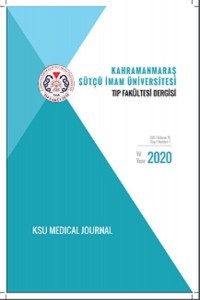Akılcı İlaç Kullanımı: İlaç Tedavisine Adherans
Adherans, ilaç tedavisi, ilaç alma davranışı, zayıf adherans
Rational Use of Drugs: Adherence with Medication
Adherence, medication, medication taking behavior, non-adherence,
___
- Farmakolojiye giriş. Kayaalp SO. Akılcıl Tedavi Yönünden Tıbbi Farmakoloji. Kayaalp SO (ed). Pelikan Yayıncılık, Ankara, 2012, 13. Baskı.
- Introduction to Clinical Pharmacology. Arthur J. Atkinson, Jr. in Principles of Clinical Pharmacology. Atkinson AJ, Huang S-M, Lertora JJL, Markey SP. Third edition, 2012: 1-9 Academic Press, Elsevier, UK.
- The Rational Use of Drugs. Report of the Conference of Experts. Nairobi, 25-29 November 1985.
- Promoting rational use of medicines: core components. WHO Policy Perspectives on Medicines. September 2002 Geneva.
- Reçete Yazma Kuralları ve Akılcıl İlaç Kullanımı. Akıcı A, Oktay Ş, Kayaalp SO. Akılcıl Tedavi Yönünden Tıbbi Farmakoloji. Kayaalp SO. 13. Baskı (2012) Pelikan Yayıncılık (Ankara).
- Banning M. Older people and adherence with medication: a review of the literature. Int J Nurs Stud. 2008 Oct;45(10):1550-61.
- Sabate E, ed. Adherence to Long-Term Therapies: Evidence for Action. Geneva, Switzerland: World Health Organization: 2003.
- Steiner JF, Earnest MA. The language of medication-taking. Ann Intern Med. 2000 Jun 6;132(11):926-30.
- Osterberg L, Blaschke T. Adherence to medication. N Engl J Med. 2005 Aug 4;353(5):487-97.
- Brown MT, Bussell JK. Medication adherence: WHO cares? Mayo Clin Proc. 2011 Apr;86(4):304-14.Tajouri TH, Driver SL, Holmes DR Jr. 'Take as directed'--strategies to improve adherence to cardiac medication. Nat Rev Cardiol. 2014 May;11(5):304-7.
- Yap AF, Thirumoorthy T, Kwan YH. Medication adherence in the elderly. Journal of Clinical Gerontology & Geriatrics 2016; 7: 64-67.
- Banning M. A review of interventions used to improve adherence to medication in older people. Int J Nurs Stud. 2009 Nov;46(11):1505-15.
- Singh HK, Kennedy GA, Stupans I. A systematic review of pharmacy health coaching and an evaluation of patient outcomes. Res Social Adm Pharm. 2018 Apr 21.
- Suzuki T, Shiga T, Omori H, Tatsumi F, Nishimura K, Hagiwara N. Self-Reported Non-adherence to Medication in Japanese Patients with Cardiovascular Diseases. Am J Cardiovasc Drugs. 2018 May 11.
- Glader EL, Sjölander M, Eriksson M, Lundberg M. Persistent use of secondary preventive drugs declines rapidly during the first 2 years after stroke. Stroke. 2010 Feb;41(2):397-401.
- Costa FV. Compliance with antihypertensive treatment. Clin Exp Hypertens. 1996 Apr-May;18(3-4):463-72.
- Cramer JA, Benedict A, Muszbek N, Keskinaslan A, Khan ZM. The significance of compliance and persistence in the treatment of diabetes, hypertension and dyslipidaemia: a review. Int J Clin Pract. 2008 Jan;62(1):76-87.
- Elliott WJ. What factors contribute to the inadequate control of elevated blood pressure? J Clin Hypertens (Greenwich). 2008 Jan;10(1 Suppl 1):20-6.
- Rodriguez F, Cannon CP, Steg PG, Kumbhani DJ, Goto S, Smith SC, Eagle KA, Ohman EM, Umez-Eronini AA, Hoffman E, Bhatt DL; REACH Registry Investigators. Predictors of long-term adherence to evidence-based cardiovascular disease medications in outpatients with stable atherothrombotic disease: findings from the REACH Registry. Clin Cardiol. 2013 Dec;36(12):721-7.
- Badanta-Romero B, de Diego-Cordero R, Rivilla-García E. Influence of Religious and Spiritual Elements on Adherence to Pharmacological Treatment. J Relig Health. 2018 Mar 26.
- Rodriguez F, Cannon CP, Steg PG, Kumbhani DJ, Goto S, Smith SC, Eagle KA, Ohman EM, Umez-Eronini AA, Hoffman E, Bhatt DL; REACH Registry Investigators. Predictors of long-term adherence to evidence-based cardiovascular disease medications in outpatients with stable atherothrombotic disease: findings from the REACH Registry. Clin Cardiol. 2013 Dec;36(12):721-7.
- Park NH, Song MS, Shin SY, Jeong JH, Lee HY. The effects of medication adherence and health literacy on health-related quality of life in older people with hypertension. Int J Older People Nurs. 2018 Apr 17:e12196.
- Drug Therapy of Depression and Anxiety Disorders. Baldessarini RJ. in Goodman & Gilman’s The Pharmacological Basis of Therapeutics. Brunton LL, Lazo JS, Parker KL. Eleventh edition, 2006: 461-501 Academic Press, Elsevier, UK.
- Thomson K, Brouwers C, Damman OC, de Bruijne MC, Timmermans DR, Melles M. How Health Care Professionals Evaluate a Digital Intervention to Improve Medication Adherence: Qualitative Exploratory Study. JMIR Hum Factors. 2018 Feb 20;5(1):e7.
- Kripalani S, LeFevre F, Phillips CO, Williams MV, Basaviah P, Baker DW. Deficits in communication and information transfer between hospital-based and primary care physicians: implications for patient safety and continuity of care. JAMA. 2007 Feb 28;297(8):831-41.
- Wimmer BC, Cross AJ, Jokanovic N, Wiese MD, George J, Johnell K, Diug B, Bell JS. Clinical Outcomes Associated with Medication Regimen Complexity in Older People: A Systematic Review. J Am Geriatr Soc. 2017 Apr;65(4):747-753.
- İlaç uygulama Yolları ve Uygulama Yolundan Absorbsiyon. Oktay Ş, Kayaalp SO. Akılcıl Tedavi Yönünden Tıbbi Farmakoloji. Kayaalp SO (ed). Pelikan Yayıncılık, Ankara, 2012, 13. Baskı.
- Gordon K, Smith F, Dhillon S. Effective chronic disease management: patients' perspectives on medication-related problems. Patient Educ Couns. 2007 Mar;65(3):407-15.
- ISSN: 1303-6610
- Yayın Aralığı: Yılda 3 Sayı
- Başlangıç: 2004
- Yayıncı: Kahramanmaraş Sütçü İmam Üniversitesi
Tüp, İkiz ve Üçüz Bebeklerin TEOAE ve Latans Sürelerinin Karşılaştırılması
Hiperlipidemi ve Erektil Disfonksiyon
Çocukta Serebral Tutulumun Eşlik Ettiği Kardiyak Kist Hidatik: Olgu Sunumu
Aydın TUNÇAY, Ömer Naci EMİROĞULLARI
Hüseyin GÜMÜŞ, Halil KAZANASMAZ
Akılcı İlaç Kullanımı: İlaç Tedavisine Adherans
Yusuf ERGÜN, Duygun ALTINTAŞ AYKAN
Hüseyin ÖZTARAKÇI, Saime SAĞIROĞLU, Mehmet Akif KILIÇ
Metin KILINÇ, Hatice SAĞER, Eda GANİYUSUFOĞLU, Yeliz DOBOĞLU, Nazlı ÜLKER HANÇER
